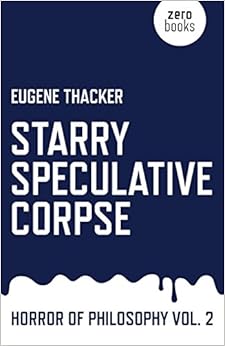


“I would propose that horror not be understood as dealing with human fear in a human world ( the world-for-us ), but that horror be understood as being about the limits of the human as it confronts a world that is not just a World, not just a Earth, but also a Planet ( the world-without-us). This also means that horror is not simply about fear, but instead about the enigmatic thought of the unknown.”
There is a very interesting strain of philosophy emerging in the last couple years. A philosophy of pessimism that uses weird horror as a springboard to explore the ever more chaotic and strange world we live in. At the forefront of this movement is Eugene Thacker author and teacher at The New School in New York. He has published a trilogy of books that are must owns to anyone interested in this field. His Horror of Philosophy trilogy seeks to show that Weird Horror and pessimistic philosophy have similar goals. To travel to the limit of thought and show the truths that can not be dealt with. To talk of the paradoxical and the hidden. The books themselves are wondrously entertaining. Thacker is a gifted writer and can hit you with some poetic yet tenebrous prose. His writing takes the form of short essays and aphorisms tackling a wide assortment of topics, such as religious mysticisms views on darkness, the symbolism of tentacles, the use of ghostly hair in horror films, or the negation of music in the Japanese noise genre. The trilogy almost serves as a encyclopedia of weird horror concepts.
The first book, In The Dust Of This Planet, is kind of an overview of pessimism. Some really interesting chapters on Black Metal, inhuman beings in horror, and ecological horror. The second book, Starry Speculative Corpse, looks at works of philosophy as if they were works of horror fiction, mainly focusing on Descarte, Nietzsche, Kant and Bataille. Here he talks of the demon that haunts philosophy, that the very act of thinking can be an illusion and our senses can not be trusted. The third book, Tentacles Longer Than Night, focuses on work of horror as if they were works of philosophy, he discusses the works of Dante, Lautreamont, Lovecraft and Ligotti. There is excellent studies in this book of The Songs of Maldoror, and the abstract horror film. In all three books there is a struggle to come to terms with the not human, the alien. In these studies of the alien we find that we are, in fact, the aliens, unknowable to ourselves and each other.
“...what genre horror does do is it takes aim at the presuppositions of philosophical inquiry - that the world is always for us - and makes of these blind spots its central concern, expressing them not in abstract concepts but in a whole bestiary of impossible life forms = mists, ooze, blobs, slime, clouds and muck.”
I think what makes Pessimistic Philosophy different from Weird Horror is the approach and the end goal. Pessimistic Philosophy is the cold stare into the void. It uses a scientific method to study this void and attempts to capture it in a formula in book form. It seems to me that Weird Horror is a mostly erotic enterprise that finds an almost orgasmic sensation in plunging into the darkest mysteries and bleak reality of existence. Its mission is to make a kind of poetry of the dark abyss we are all lost in. Which differentiates it from mainstream horror, whose purpose is to provide cheap jump scares and easy gore shocks to give you a roller coaster fun ride, but utterly empty of meaning or beauty. It’s something that unites many different writers into the weird horror lineage, Poe, Baudelaire, Lovecraft, Kafka, Borges, Bradbury, Kiernan, Ligotti, these hymns to the void, making the bleak, beautiful. And this is where Thacker is so brilliant, right in the middle of a essay he will all of a sudden out of nowhere bring you some of the most beautiful turns of phrase you have ever read. These books are essential to anyone interested in the darker roads of thought.
“And so the human being discovers , at last, that its existence has always been sustended by its non-existence, that it dies the moment it lives, and that, perhaps, we do nothing but carry around a corpse that carries around the sullen grey matter that occasionally wonders if the same sullen stars that occupy every firmament at every scale also occupy this starry speculative corpse.”
You may want to check Cioran's work if you haven't done so yet. He is considered one of the fathers of Western Pessimism in philosophy and dosplays both a disturbing insight and wry humor in his aphorisms.
ReplyDeleteOh I do love Cioran's work. But yeah that's a good suggestion. I recommend any of my readers who like pessimistic philosophy to check out Cioran's work, especially The Trouble With Being Born.
Delete